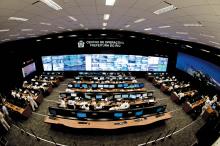US business leaders briefed Vice President Joe Biden and US Transportation Secretary Anthony Foxx yesterday on business issues associated with transportation infrastructure during a meeting hosted by the White House Business Council and Business Forward.
Meeting participants included executives from large manufacturers, shipping companies, trade associations, and a range of other businesses, including Doug Oberhelman, chairman and CEO, Caterpillar, and Matt Rose, executive chairman, Burlington Northern S
US business leaders briefed Vice President Joe Biden and US Transportation Secretary Anthony Foxx yesterday on business issues associated with transportation infrastructure during a meeting hosted by the White House Business Council and Business Forward.
Meeting participants included executives from large manufacturers, shipping companies, trade associations, and a range of other businesses, including Doug Oberhelman, chairman and CEO,5551 Caterpillar, and Matt Rose, executive chairman, Burlington Northern Santa Fe.
“Transportation used to have bipartisan support, but now we’re busy having philosophical discussions about government spending. Our job right now is to create a moment when something greater can happen. The business community will have a critical role in standing together to support smart public investments in infrastructure projects,” said Foxx.
The meetings focused on two key points: the economic costs associated with a crumbling infrastructure and the need for Washington to put politics aside and focus on a transportation plan that will keep American goods and people moving. The group agreed that this is a critical time where they must come together to restore America’s leadership in the global economy.
"The implications of an insolvent highway trust fund should be obvious to all Americans and that’s why Congress must take action. Failing to agree on a long-term, apolitical strategy to fund our infrastructure will have a deleterious effect on highway safety, the environment and our nation’s economic wellbeing,” said Steve Williams, chairman and CEO, Maverick USA in Little Rock, Arkansas.
Business leaders expressed concerns that the United States is falling behind other industrialised countries that are investing heavily in transportation infrastructure. While China spends around nine per cent of its GDP on infrastructure, the United States only spends around two per cent.
Business leaders also discussed the barriers preventing federal transportation infrastructure investments and shared suggestions based on their experiences.
The group specifically explained how uncertainty surrounding funding for the Highway Trust Fund and associated project delays harms their ability to begin new projects and hire new workers. Business leaders also expressed frustration that policymakers have been wasting time on transportation funding, developing weak, short-term solutions to growing problems.
“The big takeaway from our briefing is that a short-term fix for the Highway Trust Fund is absolutely essential. This country has had only modest job gains and without a fix we could lose 700,000 more jobs,” said Nick Ivanoff, first vice chairman of the American Road and Transportation Builders Association. “However, after that fix is in place, it is imperative to put together a plan for long-term sustainable funding. Most importantly, all options must remain on the table.”
Meeting participants included executives from large manufacturers, shipping companies, trade associations, and a range of other businesses, including Doug Oberhelman, chairman and CEO,
“Transportation used to have bipartisan support, but now we’re busy having philosophical discussions about government spending. Our job right now is to create a moment when something greater can happen. The business community will have a critical role in standing together to support smart public investments in infrastructure projects,” said Foxx.
The meetings focused on two key points: the economic costs associated with a crumbling infrastructure and the need for Washington to put politics aside and focus on a transportation plan that will keep American goods and people moving. The group agreed that this is a critical time where they must come together to restore America’s leadership in the global economy.
"The implications of an insolvent highway trust fund should be obvious to all Americans and that’s why Congress must take action. Failing to agree on a long-term, apolitical strategy to fund our infrastructure will have a deleterious effect on highway safety, the environment and our nation’s economic wellbeing,” said Steve Williams, chairman and CEO, Maverick USA in Little Rock, Arkansas.
Business leaders expressed concerns that the United States is falling behind other industrialised countries that are investing heavily in transportation infrastructure. While China spends around nine per cent of its GDP on infrastructure, the United States only spends around two per cent.
Business leaders also discussed the barriers preventing federal transportation infrastructure investments and shared suggestions based on their experiences.
The group specifically explained how uncertainty surrounding funding for the Highway Trust Fund and associated project delays harms their ability to begin new projects and hire new workers. Business leaders also expressed frustration that policymakers have been wasting time on transportation funding, developing weak, short-term solutions to growing problems.
“The big takeaway from our briefing is that a short-term fix for the Highway Trust Fund is absolutely essential. This country has had only modest job gains and without a fix we could lose 700,000 more jobs,” said Nick Ivanoff, first vice chairman of the American Road and Transportation Builders Association. “However, after that fix is in place, it is imperative to put together a plan for long-term sustainable funding. Most importantly, all options must remain on the table.”








